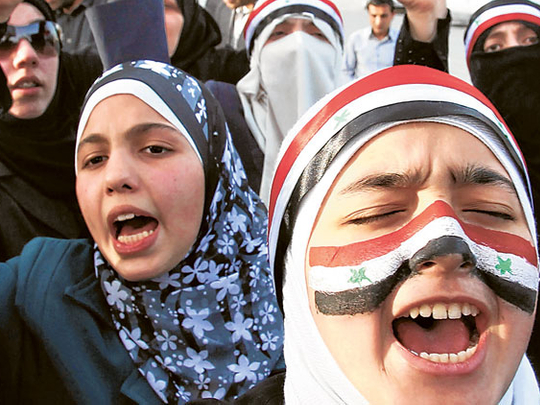
Damascus: The US State Department has secretly financed Syrian political opposition groups and related projects, including a satellite TV channel that beams anti-government programming into the country, according to previously undisclosed diplomatic cables.
The London-based satellite channel, Barada TV, began broadcasting in April 2009 but has ramped up operations to cover the mass protests in Syria as part of a long-standing campaign to overthrow the country's leader, Bashar Al Assad.
In focus: Unrest in the Middle East
Human rights groups say scores of people have been killed by pro-Al Assad security forces since the demonstrations began on March 18; Syria has blamed the violence on "armed gangs." Barada TV is closely affiliated with the Movement for Justice and Development, a London-based network of Syrian exiles.
Classified US diplomatic cables show the State Department has funnelled as much as $6 million to the group since 2006 to operate the satellite channel and finance other activities inside Syria.
Bush legacy
The channel is named after the Barada River, which courses through the heart of Damascus, the Syrian capital. The US money for Syrian opposition figures began flowing under President George W. Bush after he effectively froze political ties with Damascus in 2005.
The financial backing has continued under President Barack Obama, even as his administration sought to rebuild relations with Al Assad. In January, the White House posted an ambassador to Damascus for the first time in six years.
The cables, provided by the anti-secrecy website WikiLeaks, show that US Embassy officials in Damascus became worried in 2009 when they learned that Syrian intelligence agents were raising questions about US programmes.
Some embassy officials suggested that the State Department reconsider its involvement, arguing that it could put the Obama administration's rapprochement with Damascus at risk.
Syrian authorities "would undoubtedly view any US funds going to illegal political groups as tantamount to supporting regime change," read an April 2009 cable signed by the top-ranking US diplomat in Damascus at the time.
"A reassessment of current US-sponsored programming that supports anti-[government] factions, both inside and outside Syria, may prove productive," the cable said.
It is unclear whether the State Department is still funding Syrian opposition groups, but the cables indicate money was set aside at least through September 2010. While some of that money has also supported programs and dissidents inside Syria, The Washington Post is withholding certain names and programme details at the request of the State Department, which said disclosure could endanger the recipients' personal safety.
The State Department declined to comment on the authenticity of the cables or answer questions about its funding of Barada TV. Tamara Wittes, a deputy assistant secretary of state, who oversees the democracy and human rights portfolio in the Bureau of Near Eastern Affairs, said the State Department does not endorse political parties or movements.
‘Set of principles'
"We back a set of principles," she said. "There are a lot of organisations in Syria and other countries that are seeking changes from their government. That's an agenda that we believe in and we're going to support."
In February 2006, when relations with Damascus were at a nadir, the Bush administration announced that it would award $5 million in grants to "accelerate the work of reformers in Syria."
But no dissidents inside Syria were willing to take the money, for fear it would lead to their arrest or execution for treason, according to a 2006 cable from the US Embassy, which reported that "no bona fide opposition member will be courageous enough to accept funding."
Around the same time, Syrian exiles in Europe founded the Movement for Justice and Development. The group, which is banned in Syria, openly advocates Al Assad's removal. US cables describe its leaders as "liberal, moderate Islamists" who are former members of the Muslim Brotherhood.
People involved with the group and with Barada TV, however, would not acknowledge taking money from the US government. "I'm not aware of anything like that," Malik Al Abdeh, Barada TV's news director, said in a brief telephone interview from London.
Abdeh said the channel receives money from "independent Syrian businessmen" whom he declined to name. He also said there was no connection between Barada TV and the Movement for Justice and Development, although he confirmed that he serves on the political group's board. The board is chaired by his brother, Anas.
"If your purpose is to smear Barada TV, I don't want to continue this conversation," Malik Al Abdeh said. "That's all I'm going to give you."
Several US diplomatic cables from the embassy in Damascus reveal that the Syrian exiles received money from a State Department programme called the Middle East Partnership Initiative. According to the cables, the State Department funnelled money to the exile group via the Democracy Council, a Los Angeles-based nonprofit.
Partnership
The cables report persistent fears from US diplomats that Syrian state security agents had already uncovered the money trail from Washington. A September 2009 cable reported that Syrian agents had interrogated a number of people about "MEPI operations in particular," a reference to the Middle East Partnership Initiative.
"It is unclear to what extent [Syrian] intelligence services understand how USG money enters Syria and through which proxy organisations," the cable stated. "What is clear, however, is that security agents are increasingly focused on this issue." US diplomats also warned that Syrian agents may have "penetrated" the Movement for Justice and Development by intercepting its communications.
"If the [Syrian government] does know, but has chosen not to intervene openly, it raises the possibility that the [government] may be mounting a campaign to entrap democracy activists."












